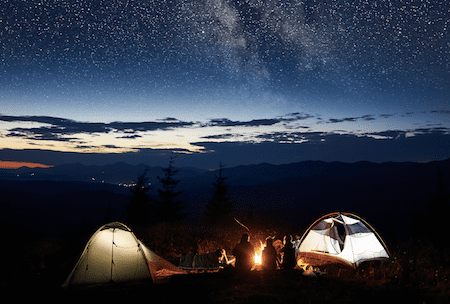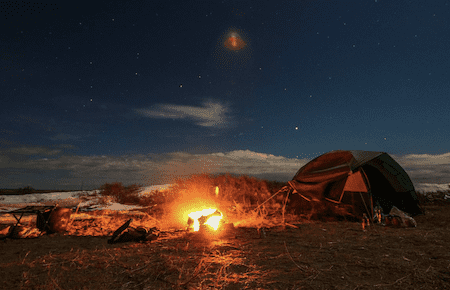Living in a tent away from the city’s bustling and hustling is becoming popular day by day. People are taking boondocking seriously.
Boondocking is living off-grid in the wilderness. People choose this lifestyle to connect with nature as they find the wilderness therapeutic.
However, living in a tent for long term is not something you can plan overnight. It takes a lot of planning that you need to take to make your tent feel like an actual home.
At the same time, you also need the willpower and determination to leave the four solid walls that you call home and start embracing nature.
Despite knowing all the probable adversities, if you are still seriously looking for ways and passionate enough to learn how to live in a tent long term, then this guide is surely for you.
Have a good read before you start your journey of boondocking.
How To Live In A Tent Long Term
People these days are becoming more aware of minimalistic lifestyles and sustainability.
It’s also been reported that some people sold off their property and started living in a tent.
Camping teaches invaluable practical survival skills while encouraging sustainability and eco-friendliness.
To know how to live in a tent long term, you need to have a clear idea about the items that you’ll require.
It’ll give you brief guidance and a heads-up about what you need and what you have to do.
Once you have everything you need, go through the steps of setting up your camp life properly.
#1. Get The Appropriate Tent For Camping
Choose a durable tent for long-term usage and withstand harsh weather conditions.
It’s advisable to get a comfortable and spacious tent. Make sure to have enough protection for your long-term tent life.
If you’re going live alone in the tent, you can purchase a two-person tent.
It will give you enough space to store your belonging and live comfortably. If you are going to live with someone else, you can go for a tent with separate rooms.
#2. Find A Suitable Location
It’s necessary to do your research while choosing a suitable spot.
You can go for dedicated camping posts a few km away from the central town. It applies mainly to new campers.
If you want a more exciting experience, you can choose various legal forests and mountain grounds to camp.
However, you need to ensure that the locations have enough security, and it is advisable if you are near some medical facilities in case of an emergency.
#3. Setting Up Your Tent Properly
You need to make sure that you set up your tent on higher flat ground.
Then, go through all the setting up manuals to set up your tent. The challenging part of setting up your tent is to fix the pegs and bury them in the ground.
Make sure you don’t break your tent poles because that will result in a flimsy tent.
To maximize the comfort level, you can put thick layers of blankets on the ground of your tent.
I suggest avoiding pitching a tent on gravel.
#4. Food Source And Water Purification
You need to stock up on canned food, dried food, and camping-friendly packaged food.
You can also bring frozen food if you have a solar-powered cooler.
If you want to have fresh food, you can hunt for fish in the stream or hunt animals if the location permits.
You should plant vegetables if you stay in one area for a prolonged time.
You can boil the water and use various filtration methods to have purified water for water purification.
Investing in water purifying devices is a good idea to make your experience easier.
#5. Ensure Maximum Comfort
Invest in good durable sleeping pads, pillows, and blankets.
Getting comfortable sleep is essential to recharge yourself after having a long day in the wilderness.
It’s necessary to have comfortable beddings to avoid muscle stiffness.
#6. Keep Your Belongings Safe
The chances of getting robbed get lower if you live off the grid.
However, it is still recommended to keep your belongings safe. You can put your money and other valuable things in a small locker box.
It’s always better to be safe than sorry.
#7. Learn About The Local Wildlife
Researching the local wildlife of your camping location is a must. Many campsites have large animals and bears.
Hence, it’s essential to be aware of what you may face during your camping.
Always follow the leave no trace rule to avoid attracting any animals near your campsite.
#8. Personal Hygiene
It’s challenging to maintain personal hygiene in a tent. However, you need to find ways to improvise.
If you stay at a dedicated campsite, there will be showering facilities to make your entire experience more seamless.
If you live entirely off the grid, you need to carry a lot of wet wipes as an alternative to showering.
You won’t get enough opportunity to have a whole body showering in the wilderness.
It’s recommended to set up your tent near a water source to maintain your hygiene.
You can also collect rainwater and utilize the water for your hygiene.
#9. Communication Medium
Have a proper communication medium even if you are going off the grid.
Communication is needed to keep your family members updated, and it is also handy during emergencies.
It’s hard to predict when something can go wrong, especially in the wild.
Hence, having a communication medium increases your security.
#10. Transportation Medium
Having a transportation medium with you never hurts your camp life.
The best transportation mediums are bikes when it comes to camping. If you need to move somewhere quickly, the bike will help a lot.
You can also use the bike to explore new areas around your site.
It can help you avoid a monotonous routine.
Tips On Surviving Harsh Weather Conditions In A Tent
You’ll face challenging weather conditions in the wild, from extreme winter to extreme summer.
And that’s why your training on how to live a in a tent long term won’t be complete without this lesson.
#1. Surviving The Winter
It’s tough to survive harsh winter in a tent. The essential factor you need to make sure of is to stay warm during the winter and minimize heat loss.
First, you need to get a four-season tent to combat seasonal changes.
During cold weather, you need to use insulation inside your tent. You can opt for natural insulation like using woolen blankets.
Then, to increase the heat, you can invest in a heater with solar power.
You can also use your camping stove inside if your tent is a canvas tent. Also, you can use a candle tent heater.
#2. Don’t Forget The Summer
Cooling down your tent during sweltering weather is easier to deal with than generating heat.
You can use your tent’s vents and install fans to improve the air circulation of your tent.
You can invent intent air conditioning if you have solar power.
Getting an air conditioner may be a lifesaver if you are in a hot climate, as it will reduce the heat and humidity inside your tent.
Also, make sure you learn how to keep the tent cool without electricity.
Benefits And Downsides Of Living In A Tent For Long Term
Living in a tent long-term is one of the simplest ways to reduce wastage from your daily routine.
That’s when you realize that you only need the bare minimum to survive without sacrificing your comfort entirely.
Before you learn how to live in a tent long term, you need to know the benefits it’ll offer.
Benefits Of Living In A Tent Long Term
Giving up your cozy warm home where everything is readily available is a very big decision to make.
Some people may even call you crazy if you propose the idea of living in a tent instead of your home.
However, there are several benefits of living in a tent that outweighs the comfort of living in a typical home.
#1. You Are Lowering Your Carbon Footprint
People are trying to impact saving the earth by minimizing their carbon footprint.
Tent life is one of the significant ways to live your life in a minimalist way that encourages sustainably and reduces unnecessary wastage.
#2. Cost-Friendly
We can all agree that living costs are extraordinarily high and will get higher.
Living in a tent for the long term saves you a lot of money as you don’t have to pay rent, electricity bills, and other service charges.
#3. Therapeutic Experience
One of the popular reasons why you can opt for tent life is relaxation.
You’ll find living minimally surrounded by the wilderness peaceful compared to all the car honking and chaos from the city life.
Downsides Of Living In A Tent long Term
Nothing in the world comes without any hardship, which is also applicable when living in a tent for a long term.
You need to keep these drawbacks in mind and find a way to deal with them if you are dedicated to embracing the tent life.
#1. Harsh Weather Conditions
You should expect this if you are choosing the tent lifestyle. You will face extreme weather conditions now and then.
It might be raining cats and dogs, and you’ll be having an existential crisis because the strong wind destroys your tent pole.
If you live in a tent all year round, you will face long periods of rain, which can be a nuisance.
#2. It Takes Time To Adapt The Tent Life
It’s challenging to adapt to a new lifestyle, and every human being needs time to adjust when they shift from one environment to other.
You might get overwhelmed by the camping experience at first.
However, long-term campers get used to surviving in the wildlife at some point.
Hence a lot of patience and dedication is required.
#3. Discomfort And Stiffness
Many people complain that prolonged camping makes them stiff due to the confined space and lack of proper comfortable bedding.
#4. Only Sticking To Camp Stove-Friendly Meals
You also need to give up on your fancy weekend feast when choosing the tent life.
Living in a tent is already hectic, and it is pretty challenging to make different courses of meals on a camping stove.
You need to rely on one-pots, packaged food, and canned food.
#5. Cutting Down On Hygiene
It’s one of the most aggravating factors that may discourage some people from living in a tent.
You will miss a proper shower for several days or weeks when you live in a tent.
Shower or built-in toilets are not available with your tents, so you need to improvise.
#6. No Constant Source Of Electricity
You will not find a constant electricity source for charging your mobile phones, GPS, and other electronics essential for camping.
Most long-term campers use solar charge as their ultimate energy source, and sometimes they need to stop at gas stations if they need to change something urgently.
How To Live In A Tent Long Term: Essential Questions To Ask
Regardless of the amount benefits camp life offers, you need to make this decision only after asking a few essential questions.
Is It Legal To Stay In A Tent For An Extended Period?
You need to get permission from the state office for long-term camping.
The state officials will evaluate your application for approval and then check the location for safety.
If the officers find that the area is not safe for camping for a long time, they will reject the request.
However, if you choose a secure location, you can quickly get permission and start your new lifestyle living in a tent.
You can also get spots that you need to pay for in dedicated camping areas, but it may not be beneficial in the long term.
Are You Going To Live In A Tent Alone Or With Someone Else?
You should spend some time contemplating this as it is crucial.
If you will have a soul-searching moment, then living alone in the tent for the long term would be challenging but exciting.
On the other hand, if you have companions to accompany you with the tent lifestyle, it‘ll be another experience.
What Is Your End Goal From The Tent Life?
You should figure out your end goal from the tent lifestyle and what kind of changes you expect from the entire journey.
You may have several reasons to choose this lifestyle, but it is essential always to prioritize your goals.
Are You Going To Live In The Tent All Year Round, Or It’s Just A Seasonal Thing?
You need to decide if you want to take the challenge of living in the tent all year round or if you want to camp out for a particular season.
It is essential to make up your mind beforehand as it gives you an upper hand in making a proper decision.
Where Will You Be Setting Up Your Camp?
If you are new at this, you should look for legal camping grounds as it has some facilities and security.
However, if you have prior camping experience, you can explore various locations but ensure proper safety.
What Will You Do With Your Belongings If You Choose The Tent Life?
Many people sell their property and belongings that they don’t need when choosing the long-term tent lifestyle.
It is a huge decision, so you need to give some time to evaluate the decision you will be taking.
FAQs
Is It Legal To Live In A Tent Long Term?
It’s legal to live in a tent for the long term. You need to make sure you have the proper required documents for camping.
A lot of camping sites require special permission from state officials.
You can legally camp in that spot if you get approval from them.
As long as you’re maintaining rules and regulations, you will not face legal issues with your tent lifestyle.
If you choose a location off the grid, then make sure you avoid areas that are off-limits to citizens or private properties.
Can You Camp In The Woods?
Yes, you can camp in the woods, which are permitted for camping.
State officials need to make sure that the area in the woods has proper security and is under their control to grant permission for camping.
In many cases, camping licenses and permits are required to camp for an extended period in the woods.
Can You Live In The Wilderness Legally?
Yes, living in the wilderness is legalized where camping is permissible.
However, many forests are not permitted for camping, and you will face legal consequences if you try to trespass.
What Should You Avoid During Camping?
If you are camping at a dedicated campsite, you will find proper guidelines about what to bring and what not to bring.
A lot of campsites don’t allow alcohol or hunting animals.
It’s advisable to research all the rules and regulations of the campsites before you progress further.
Ending Notes
Long-term camping is a fantastic idea to promote a minimalistic lifestyle and sustainability.
If you love to take on challenges and want to enrich your survival skills, choosing the tent life will be exciting.
However, you need to accept that nature is not forgiving.
You need proper mental and physical preparation for all the challenges you need to face during your tent lifestyle journey.
Hopefully, you got a brief guideline about how to live in a tent long term.
Good luck with your camping adventure!






